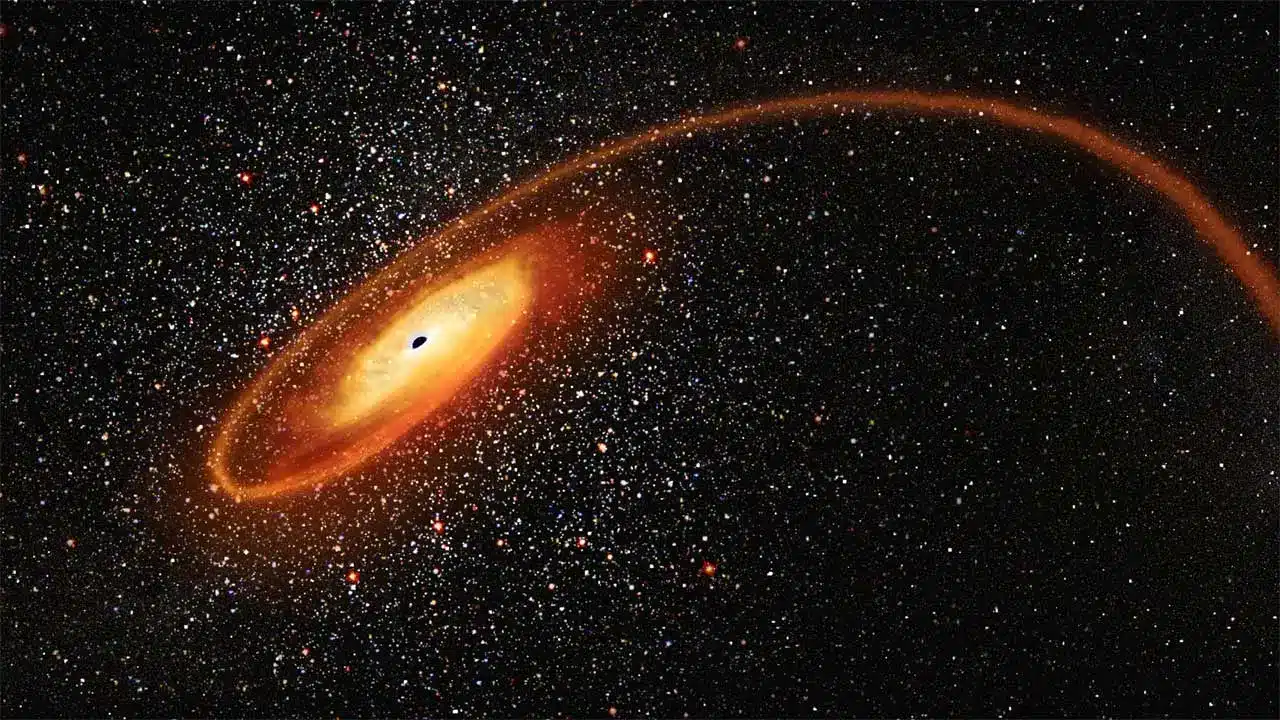About Tidal Disruption Event (TDE)
- Tidal disruption events (TDEs) are astronomical phenomena that occur when a star passes close enough to a supermassive black hole and is pulled apart by the black hole’s tidal forces, causing the process of disruption.
- Such tidally disrupted stellar debris starts raining down on the black hole and radiation emerges from the innermost region of accreting debris, which is an indicator of the presence of a TDE.
- How does a TDE typically unfold?
- Close Approach: A star in a galaxy approaches a black hole on a very close trajectory due to gravitational interactions within the galaxy.
- Tidal Forces: As the star gets closer to the black hole, the gravitational forces acting on it become increasingly uneven due to the difference in gravitational pull on the near side and far side of the star. These tidal forces can be strong enough to disrupt the star.
- Stellar Disruption: When the tidal forces exceed the self-gravitational forces holding the star together, it undergoes a process called “tidal disruption.” The star is stretched and eventually torn apart into a stream of gas and debris.
- Accretion Disk Formation: The debris from the disrupted star forms an accretion disk around the black hole. This disk is composed of hot gas and dust, and it spirals inwards towards the black hole.
- Energy Release: As the material in the accretion disk spirals inwards, it releases a tremendous amount of energy in the form of X-rays and ultraviolet radiation.
- Flares and Observations: TDEs are often observed as bright flares of radiation from the centre of a galaxy. These flares can last for several months to years, gradually fading as the disrupted star’s material is consumed by the black hole.
Q1) What is a Black Hole?
Black holes are regions in space where an enormous amount of mass is packed into a tiny volume. This creates a gravitational pull so strong that not even light can escape.Most black holes form from the remnants of a large star that dies in a supernova explosion. (Smaller stars become dense neutron stars, which are not massive enough to trap light.)
Source: Observations shed more light on the properties of the nearest tidal disruption event
Last updated on February, 2026
→ UPSC Notification 2026 is now out on the official website at upsconline.nic.in.
→ UPSC IFoS Notification 2026 is now out on the official website at upsconline.nic.in.
→ UPSC Calendar 2026 has been released.
→ UPSC Final Result 2025 is expected to be released in the second week of April 2026.
→ Check out the latest UPSC Syllabus 2026 here.
→ Join Vajiram & Ravi’s Interview Guidance Programme for expert help to crack your final UPSC stage.
→ UPSC Mains Result 2025 is now out.
→ UPSC Prelims 2026 will be conducted on 24th May, 2026 & UPSC Mains 2026 will be conducted on 21st August 2026.
→ The UPSC Selection Process is of 3 stages-Prelims, Mains and Interview.
→ Prepare effectively with Vajiram & Ravi’s UPSC Prelims Test Series 2026 featuring full-length mock tests, detailed solutions, and performance analysis.
→ Enroll in Vajiram & Ravi’s UPSC Mains Test Series 2026 for structured answer writing practice, expert evaluation, and exam-oriented feedback.
→ Join Vajiram & Ravi’s Best UPSC Mentorship Program for personalized guidance, strategy planning, and one-to-one support from experienced mentors.
→ Check UPSC Marksheet 2024 Here.
→ UPSC Toppers List 2024 is released now. Shakti Dubey is UPSC AIR 1 2024 Topper.
→ Also check Best UPSC Coaching in India




















